Jamaica Faces Catastrophic Impact from Hurricane Melissa

Jamaica is grappling with the devastating aftermath of Hurricane Melissa, which has been described as the largest storm to ever strike the island nation. The storm has caused significant destruction, resulting in loss of life, extensive infrastructure damage, and widespread blackouts. The humanitarian crisis unfolding in Jamaica will require substantial assistance for recovery.
While the United States possesses the resources to aid Jamaica, many citizens express skepticism about the motives behind such support. Prime Minister Andrew Holness is now faced with the difficult decision of whether to seek help from the U.S. or look elsewhere. The sentiment among some observers is that Jamaica should consider alternatives, possibly turning to countries like China for assistance instead of relying on the current U.S. administration.
The United States remains the wealthiest nation globally, yet its willingness to assist has been questioned, especially given its domestic challenges. The ongoing struggles faced by millions of Americans, including cuts to the Supplemental Nutrition Assistance Program (SNAP), raise concerns about the country’s ability to effectively support foreign nations in crisis.
In a separate but equally urgent matter, Pastor Jamal Bryant, leader of New Birth Church in Georgia, has called upon his congregation to assist local communities facing food insecurity due to economic struggles. Instead of monetary donations, he encourages members to bring canned goods for a drive-thru food distribution initiative. His sermon highlighted the alarming reality that, as of November 1st, SNAP benefits will be cut, impacting approximately 42 million Americans, or one in seven people.
Meanwhile, in Sudan, a network of mutual-aid groups known as Emergency Response Rooms (ERRs) has emerged as a beacon of hope amidst the ongoing civil war. These decentralized organizations, comprised of over 700 local volunteers, have been instrumental in providing life-saving assistance to civilians. They are addressing critical needs such as food distribution, electricity restoration, and civilian evacuations. Despite their efforts, ERRs have received less than 1% of international aid for Sudan, primarily due to the freezing of American aid earlier this year.
As global crises unfold, the role of technology in law enforcement is also under scrutiny. Recent incidents involving AI surveillance systems have raised concerns, particularly regarding their impact on marginalized communities. In one case, Taki Allen, a student at Kenwood High School in Baltimore County, was mistakenly identified as a threat based on an AI error that misidentified a bag of chips as a weapon. This incident has sparked discussions about the appropriateness of using AI in policing, especially given the historical context of racial profiling.
In the political arena, U.S. Representative Jasmine Crockett has pushed back against former President Donald Trump’s derogatory remarks about her intelligence. During an interview, Crockett emphasized the troubling pattern of attacks on women of color in politics, highlighting the need for a more respectful discourse. She stated, “This is not a guy who got in on merit…,” referring to Trump’s privileged background.
As Jamaica and other regions face immense challenges, the need for effective and compassionate responses becomes increasingly clear. The path forward will require collaboration, understanding, and a reassessment of priorities both domestically and internationally.






